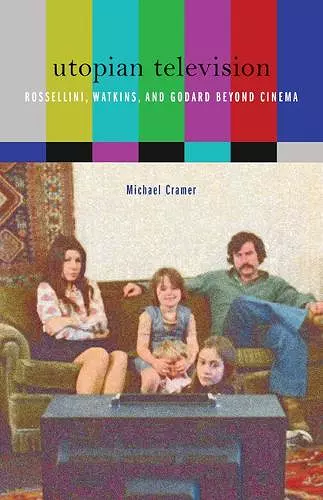Utopian Television
Rossellini, Watkins, and Godard beyond Cinema
Format:Hardback
Publisher:University of Minnesota Press
Published:14th Mar '17
Currently unavailable, and unfortunately no date known when it will be back
This hardback is available in another edition too:
- Paperback£23.99(9781517900397)

Television has long been a symbol of social and cultural decay, yet many in postwar Europe saw it as the medium with the greatest potential to help build a new society and create a new form of audiovisual art. Utopian Television examines works of the great filmmakers Roberto Rossellini, Peter Watkins, and Jean-Luc Godard, all of whom looked to television as a promising new medium even while remaining critical of its existing practices.
Utopian Television illustrates how each director imagined television’s improved or “utopian” version by drawing on elements that had come to characterize it by the early 1960s. Taking advantage of the public service model of Western European broadcasting, each used television to realize works that would never have been viable in the commercial cinema. All three directors likewise seized on television’s supposed affinity for information and its status as a “useful” medium, but attempted to join this utility with aesthetic experimentation, suggesting new ways to conceive of the relationship between aesthetics and information.
As beautifully written as it is theoretically rigorous, Utopian Television turns to the writing of Fredric Jameson and Ernst Bloch in treating the three directors’ television experiments as enactments of “utopia as method.” In doing so it reveals the extent to which the medium inspired and shaped hopes not only of a better future but of better moving image art as well.
"Both theoretical treatise and intellectual history, Michael Cramer’s intervention matches the utopian vision of its subject as he efficiently and astutely navigates us through the thorny politics of art cinema."—Karl Schoonover, University of Warwick
"Michael Cramer's fine book explores those paths not taken that define a genre, that interplay between film and TV pioneered by Rossellini in service of a now utopian social pedagogy. Peter Watkins' understudied work, along with Rossellini's experiments—unfamiliar to those who only know him through the early masterpieces—throw a wholly new light on Godard himself, and Cramer's luminous readings of the works are as stimulating as his overall theorization of this new, or perhaps missed, form."—Fredric Jameson, Duke University
"Rich and theoretically rigorous text."—CHOICE
"Cramer has done an invaluable service to those of us who esteem these works, contextualising them through contemporary writing and interviews by the filmmaker."—Sight and Sound
"Michael Cramer’s new book, Utopian Television, is an impressively constructed work of scholarship that does more than display certain utopian trends in its three subjects; it traces a discursive movement of utopian thinking through technologies. The book is a dynamic and engaging work that will be of interest to more than television scholars, dealing with movements between cinema and television, concepts of the image, and in-depth discussions of auteurs."—Senses of Cinema
ISBN: 9781517900380
Dimensions: 216mm x 140mm x 38mm
Weight: unknown
304 pages